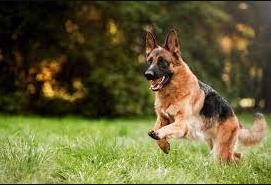Mastering Guide For German Shepherd Training | The Pet Initiative Training
Training a dog is a critical part of owning one. It not only ensures their safety but also makes them well-behaved and happy pets. However, there are various types of training, including obedience, agility, and behavior training. In this article, we will discuss Dog Day Training and specifically focus on German Shepherd Training. We will cover topics such as the importance of Dog Day Training, the benefits of training German Shepherds, the basic steps of training, and some common mistakes to avoid.
Introduction
Dogs are considered to be the best companions, but training them is vital to have a positive and enjoyable relationship. Dog Day Training is a comprehensive training program that helps dogs to learn various skills and commands. It is a great way to keep them active, healthy, and well-behaved. German Shepherds, in particular, are intelligent and versatile dogs that require proper training to keep them physically and mentally stimulated.
What is Dog Day Training?
Dog Day Training is an intensive training program designed to teach dogs basic obedience, socialization, and behavior skills. The training program usually lasts for a few weeks, and the dog is trained for a few hours every day. The training is conducted in a controlled environment with a professional dog trainer. The training program is customized based on the dog's breed, age, and temperament. The trainer works on the dog's weak areas and helps them to learn new skills and commands.
Importance of Dog Day Training
Dog Day Training is essential as it helps dogs to learn basic skills and commands, which can keep them safe and well-behaved. It also promotes their socialization skills and reduces the chances of aggressive behavior. A well-trained dog is more likely to be happier and healthier. It also helps to establish a strong bond between the dog and the owner.
Benefits of German Shepherd Training
German Shepherds are intelligent dogs that require proper training to keep them physically and mentally stimulated. Training a German Shepherd can help them learn new skills, improve their socialization, and reduce aggressive behavior. It also helps to keep them mentally stimulated, which can prevent destructive behavior. A well-trained German Shepherd is a joy to own and can be an excellent guard dog, companion, and working dog.
Basic Steps for Training German Shepherds
Training a German Shepherd requires patience, consistency, and positive reinforcement. The following are some basic steps for training German Shepherds.
Socialization
Socialization is essential for German Shepherds as it helps them to be more comfortable around people and other animals. Socialization involves exposing your dog to different environments, sounds, and situations. This helps them to learn how to behave in different situations and reduce their fear and anxiety.
Positive Reinforcement
Positive reinforcement is a training technique that involves rewarding your dog for good behavior. This technique helps to reinforce good behavior and reduce bad behavior. The rewards can be treats, toys, or verbal praise.
Leash Training
Leash training is crucial for German Shepherds as they can be strong and pull when they are on a leash. The training involves teaching your dog to walk on a leash without pulling or lunging. It helps to keep them safe and controlled when you take them for walks.
Crate Training
Crate training is another important aspect of German Shepherd training. It involves teaching your dog to feel comfortable in a crate or kennel. The crate can serve as a safe space for the dog to retreat to and can also help with housebreaking and preventing destructive behavior when you are away.
Basic Commands
Teaching your German Shepherd basic commands such as sit, stay, come, and heel is essential. These commands help to keep your dog safe and well-behaved in different situations. Consistency is key when teaching these commands, and positive reinforcement should be used.
Common Mistakes to Avoid
Training a German Shepherd can be challenging, and there are some common mistakes that owners make. Some of these mistakes include punishing bad behavior, using negative reinforcement, and inconsistent training. It is important to remember that training should be a positive experience for both the dog and the owner.
Advanced Training Techniques for German Shepherds
German Shepherds are versatile dogs that can be trained for various purposes such as search and rescue, protection, and agility. Advanced training techniques can include scent training, advanced obedience training, and protection training. These techniques require a professional trainer and are usually tailored to the dog's individual needs and temperament.

Comments
Post a Comment